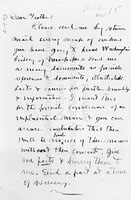

"But beyond this difference of ideal lay another and more bitter controversy. This started with the rise at Tuskegee Institute, and centering around Booker T. Washington, of what I may call the Tuskegee Machine. I was greatly disturbed at this time, not because I was in absolute opposition to the things that Mr. Washington was advocating, but because I was strongly in favor of more open agitation against wrongs and above all, I resented the practical buying up of the Negro press and choking off even mild and reasonable opposition to Mr. Washington in both the Negro press and the white."
Du Bois' opposition led to the founding of the Niagara Movement to counter Washington's influence and to press for a more direct redress of grievances for black Americans.
 Du Bois around 1907.
Du Bois around 1907.
 Du Bois enlisted the help of allies in his crusade against Booker T. Washington's "Tuskegee machine." In a letter to William Monroe Trotter, editor of the Boston Guardian, Du Bois asked for "every scrap of evidence" that would prove Washington's control over Afro-American newspapers.
Du Bois enlisted the help of allies in his crusade against Booker T. Washington's "Tuskegee machine." In a letter to William Monroe Trotter, editor of the Boston Guardian, Du Bois asked for "every scrap of evidence" that would prove Washington's control over Afro-American newspapers.
 Booker T. Washington, President of Tuskegee Institute.
Booker T. Washington, President of Tuskegee Institute.
 |  |
[ An Activist Life ][ Page 1 ][ Page 2 ][ Page 3 ][ Page 4 ][ Page 5 ][ Page 6 ][ Page 7 ][ Page 8 ][ Page 9 ]
[ Page 10 ][ Page 11 ][ Page 12 ][ Page 13 ][ Page 14 ]
[ Du Bois Central ][ SCUA home ]